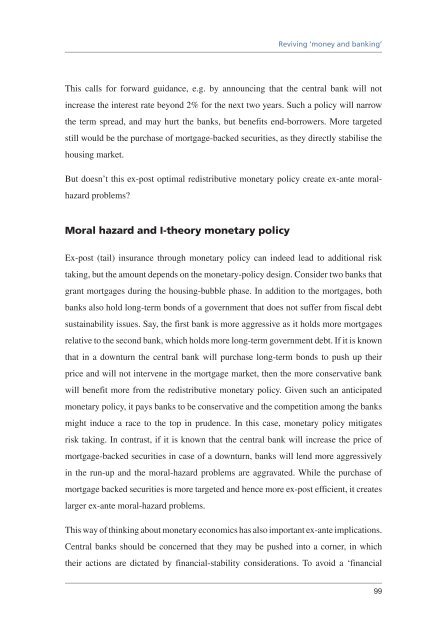Is inflation targeting dead? Central Banking After the Crisis - Vox
Is inflation targeting dead? Central Banking After the Crisis - Vox
Is inflation targeting dead? Central Banking After the Crisis - Vox
Create successful ePaper yourself
Turn your PDF publications into a flip-book with our unique Google optimized e-Paper software.
Reviving ‘money and banking’This calls for forward guidance, e.g. by announcing that <strong>the</strong> central bank will notincrease <strong>the</strong> interest rate beyond 2% for <strong>the</strong> next two years. Such a policy will narrow<strong>the</strong> term spread, and may hurt <strong>the</strong> banks, but benefits end-borrowers. More targetedstill would be <strong>the</strong> purchase of mortgage-backed securities, as <strong>the</strong>y directly stabilise <strong>the</strong>housing market.But doesn’t this ex-post optimal redistributive monetary policy create ex-ante moralhazardproblems?Moral hazard and I-<strong>the</strong>ory monetary policyEx-post (tail) insurance through monetary policy can indeed lead to additional risktaking, but <strong>the</strong> amount depends on <strong>the</strong> monetary-policy design. Consider two banks thatgrant mortgages during <strong>the</strong> housing-bubble phase. In addition to <strong>the</strong> mortgages, bothbanks also hold long-term bonds of a government that does not suffer from fiscal debtsustainability issues. Say, <strong>the</strong> first bank is more aggressive as it holds more mortgagesrelative to <strong>the</strong> second bank, which holds more long-term government debt. If it is knownthat in a downturn <strong>the</strong> central bank will purchase long-term bonds to push up <strong>the</strong>irprice and will not intervene in <strong>the</strong> mortgage market, <strong>the</strong>n <strong>the</strong> more conservative bankwill benefit more from <strong>the</strong> redistributive monetary policy. Given such an anticipatedmonetary policy, it pays banks to be conservative and <strong>the</strong> competition among <strong>the</strong> banksmight induce a race to <strong>the</strong> top in prudence. In this case, monetary policy mitigatesrisk taking. In contrast, if it is known that <strong>the</strong> central bank will increase <strong>the</strong> price ofmortgage-backed securities in case of a downturn, banks will lend more aggressivelyin <strong>the</strong> run-up and <strong>the</strong> moral-hazard problems are aggravated. While <strong>the</strong> purchase ofmortgage backed securities is more targeted and hence more ex-post efficient, it createslarger ex-ante moral-hazard problems.This way of thinking about monetary economics has also important ex-ante implications.<strong>Central</strong> banks should be concerned that <strong>the</strong>y may be pushed into a corner, in which<strong>the</strong>ir actions are dictated by financial-stability considerations. To avoid a ‘financial99














